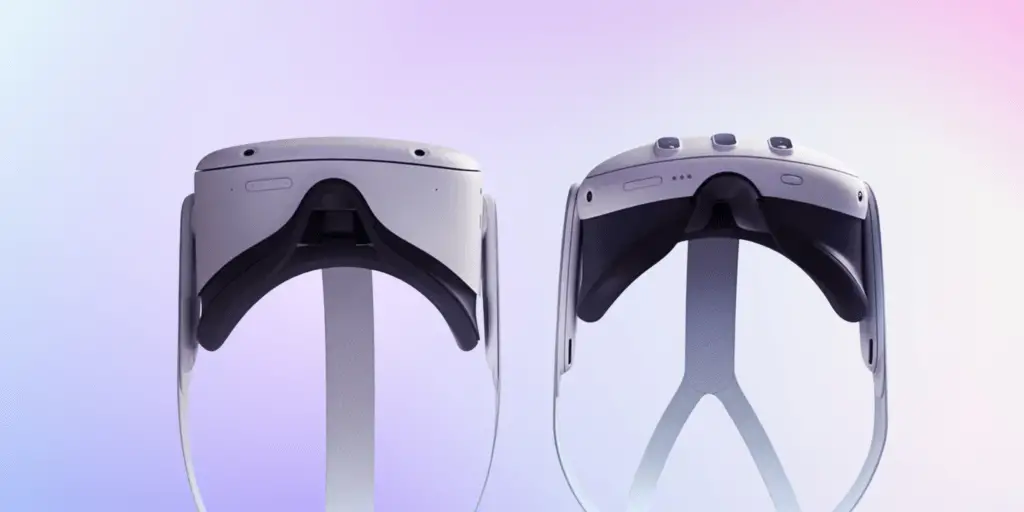Meta, formerly known as Facebook, is set to redefine the landscape with its upcoming Quest 3 Lite headset, also referred to by its codename, Ventura. This development is particularly notable as it signifies Meta’s ambitious foray into the Chinese market through a strategic partnership with Tencent, one of China’s tech titans.
This move is not just about introducing a new product; it represents a significant pivot in VR market strategies, aiming to make advanced VR technology more accessible and affordable to a broader audience.
The Quest 3 Lite is rumored to be a lighter, more budget-friendly version of the much-anticipated Quest 3, offering a simplified yet compelling VR experience. This approach could potentially democratize VR technology, making it a staple in households worldwide, beyond the enthusiasts and early adopters.
The partnership with Tencent could provide Meta with the necessary foothold in the challenging yet lucrative Chinese market, setting the stage for a fascinating clash with ByteDance, which recently acquired Pico, a significant player in the VR domain.
This strategic move by Meta, amidst the backdrop of competitive jostling and technological advancements, paints an intriguing picture of the future of VR.
As we delve deeper into the nuances of the Quest 3 Lite, the Meta-Tencent partnership, and the broader implications for the VR industry, we uncover a tale of innovation, ambition, and the relentless pursuit of market dominance in the digital age.

Meta’s Quest 3 Lite An Overview
The Meta Quest 3 Lite, tentatively known as Ventura, marks a pivotal moment in the evolution of virtual reality (VR) technology, promising to bring VR into more homes and lives than ever before. As a more affordable and accessible version of the highly anticipated Meta Quest 3, the Quest 3 Lite is designed to appeal to a wide audience, from VR enthusiasts to casual users looking to dip their toes into virtual experiences.
Although official specifications for the Quest 3 Lite remain under wraps, leaks, and reports suggest that Meta is focusing on creating a device that is not only cost-effective but also user-friendly and less cumbersome than its predecessors. The Quest 3 Lite is rumored to be significantly lighter than the Quest 2, which already boasts a comfortable 500 grams weight. This reduction in weight could dramatically enhance user comfort, making long VR sessions more enjoyable and less straining.
The Quest 3 Lite may depart from the Quest 3’s aesthetics, opting for a more streamlined and simplified look. While the Quest 3 is expected to be a powerhouse of technology, featuring advanced graphical capabilities and mixed-reality experiences, the Lite version aims to strike a balance between performance and affordability.
It might feature a more modest GPU compared to the Quest 3 but is still anticipated to offer an immersive VR experience that is accessible to a broader audience.
The Quest 3 Lite is expected to retain key features of the Quest ecosystem, such as wireless connectivity, standalone operation and access to Meta’s vast app store and social network platforms. Compatibility with popular VR games and apps will likely remain a cornerstone of the Quest 3 Lite, ensuring users have access to a rich library of content.
Meta’s commitment to software innovations like hand tracking, voice control, spatial audio, and avatars is likely to extend to the Quest 3 Lite, allowing users to enjoy a fully immersive experience without the premium price tag of higher-end models. This focus on maintaining core functionalities while reducing costs underscores Meta’s strategy to make VR more inclusive and widespread.
The introduction of the Meta Quest 3 Lite represents a strategic move to lower the barriers to VR adoption. By offering a more affordable entry point into the world of virtual reality, Meta aims to attract individuals who may have been hesitant to invest in VR technology due to cost or complexity concerns.
The Quest 3 Lite could serve as the perfect gateway for millions to explore VR, from gaming and entertainment to educational and social experiences.
The Meta-Tencent Partnership
The partnership between Meta and Tencent represents a strategic alliance with far-reaching implications for the virtual reality industry, particularly in the challenging yet vast Chinese market. This collaboration is centered around the launch and support of the Meta Quest 3 Lite, known by its codename Ventura, in China. It’s a move that combines Meta’s innovative technology with Tencent’s unparalleled market access and understanding of the Chinese consumer.
For Meta, partnering with Tencent offers a vital gateway into China’s highly regulated and competitive tech landscape. Tencent’s extensive experience and established infrastructure in the country are invaluable for navigating the complex regulatory environment and ensuring the Quest 3 Lite meets local compliance requirements.
Tencent’s insights into Chinese consumer preferences will be crucial for localizing the VR content, making it more appealing to the audience by tailoring experiences to their tastes and cultural nuances.
The partnership outlines a revenue-sharing model where Meta is expected to garner a significant portion of the device revenue. At the same time, Tencent would predominantly benefit from content revenue. This model leverages Tencent’s strengths in content distribution and monetization within China, potentially creating a lucrative ecosystem for VR content developers and publishers.
For Meta, this arrangement ensures a steady income from hardware sales while benefiting from Tencent’s content distribution capabilities. This alliance also positions Meta and Tencent against significant competitors in the Chinese VR market, notably ByteDance, which acquired Pico, a major player in the VR headset industry.
By joining forces, Meta and Tencent are not just introducing a new product but also setting the stage for broader competition in VR content and platforms. The partnership could exert pressure on ByteDance to accelerate its own VR strategies and innovations to maintain its competitive edge.
Meta’s entry into the Chinese market through Tencent also comes with its share of challenges, including the intense competition and the need for continuous innovation to meet the dynamic preferences of Chinese consumers. Additionally, regulatory scrutiny could impact the partnership’s ability to swiftly adapt and roll out new features or content.
The Meta-Tencent partnership is more than a mere collaboration; it’s a strategic maneuver that could significantly influence the VR landscape in China and beyond. By combining Meta’s technological prowess with Tencent’s market acumen, the Quest 3 Lite has the potential to become a pivotal force in making VR technology more accessible and popular among the masses.

The Competitive Landscape
ByteDance’s acquisition of Pico represents a significant foray into the VR industry, positioning the company as a serious contender against Meta and Tencent. Pico, known for its VR headsets and immersive content, brings to ByteDance a wealth of technology and expertise in VR, enabling ByteDance to tap into the growing demand for VR experiences.
This move is seen as part of ByteDance’s broader strategy to diversify its offerings and enter new digital frontiers beyond social media and content platforms.
ByteDance’s extensive experience in content creation, algorithm optimization, and user engagement provides a solid foundation for Pico’s VR content development and distribution. By leveraging ByteDance’s technological capabilities and vast user base, Pico could enhance the quality and reach of its VR content, making it more appealing to a broader audience.
Competition is fierce. Meta’s Quest 3 Lite, supported by Tencent’s distribution and localization expertise, presents a formidable challenge. Meta’s established presence in the VR market and Tencent’s understanding of the Chinese market dynamics could accelerate the adoption of the Quest 3 Lite, putting pressure on ByteDance and Pico to innovate and capture market share rapidly.
ByteDance’s decision to restructure Pico, particularly the reported layoffs affecting most of the software team while keeping the hardware team, signals a strategic recalibration. This move could indicate a focus on strengthening Pico’s hardware offerings to compete more effectively with Meta’s Quest 3 Lite.
It suggests a shift towards integrating Pico’s VR technology with ByteDance’s content ecosystems, potentially offering unique VR experiences that leverage ByteDance’s strengths in content and social networking.
The entry of Meta and Tencent into the Chinese VR market through the Quest 3 Lite, alongside ByteDance’s push with Pico, sets the stage for an intriguing battle for dominance in VR hardware and content. This competition is likely to drive innovation, leading to the development of more advanced VR technologies and immersive content that cater to the diverse needs and preferences of users in China and globally.
Rivalry extends beyond hardware to the platforms and ecosystems that support VR experiences. The success of these companies in building a compelling library of VR content and creating engaging user communities will be critical in determining their long-term positions in the market.
As VR continues to evolve, the strategies adopted by ByteDance, Meta, and Tencent will undoubtedly influence the trajectory of VR adoption and innovation, making the VR industry one of the most dynamic sectors in the digital age.
Challenges and Opportunities
One of the most significant challenges for Meta and Tencent will be navigating China’s stringent regulatory environment for technology and digital content. The regulatory landscape in China is notably dynamic, with policies that can shift rapidly, affecting how products are marketed, sold, and operated within the country. Ensuring compliance while trying to innovate and deliver a compelling user experience will require careful balancing.
The competition is not limited to ByteDance and Pico; the Chinese VR market is crowded with local and international players, each vying for a share of the growing interest in VR. Standing out in this competitive space requires not just innovative hardware but also engaging content, effective marketing, and a deep understanding of Chinese consumer preferences.
Localizing the VR experience to meet the unique tastes and cultural nuances of the Chinese market is another hurdle. This involves more than just translating language; it requires adapting content and user interfaces to reflect local customs, values, and interests. Achieving this level of localization demands in-depth market research and creative adaptation of content.
Despite these challenges, the partnership between Meta and Tencent to launch the Quest 3 Lite in China opens up significant opportunities. China represents one of the largest and fastest-growing markets for VR globally, driven by strong consumer interest in digital entertainment, gaming, and immersive experiences. Successfully capturing even a small portion of this market can lead to substantial growth.
The competitive pressure from ByteDance and other market players can spur innovation, leading to advancements in VR technology, content creation, and user experience.
This environment encourages not only technological innovation but also creative content development, contributing to the overall growth of the VR ecosystem. The Meta-Tencent partnership underscores the value of strategic alliances in overcoming market entry barriers and leveraging complementary strengths.
For Meta, Tencent’s local expertise and distribution networks are invaluable. At the same time, for Tencent, Meta’s global VR leadership and technological prowess offer a competitive edge. This model of collaboration can inspire other tech companies looking to enter or expand within the Chinese market.

Final Thoughts
The Meta Quest 3 Lite’s impending launch, facilitated through a strategic alliance between Meta and Tencent, stands as a significant milestone in the virtual reality (VR) sector, particularly within the intricate and competitive Chinese market. This collaboration not only exemplifies a pivotal move towards making cutting-edge VR technology accessible to a wider audience but also sets the stage for a dynamic shift in global VR adoption and the digital entertainment landscape.
The Quest 3 Lite, with its more affordable pricing and simplified user experience, is poised to lower the entry barriers to VR technology significantly. This endeavor could catalyze a broader acceptance and integration of VR into daily life, extending its use beyond gaming and entertainment to include education, social networking, and professional collaboration.
By making VR more accessible, Meta and Tencent are not just expanding their market reach; they are fostering a more inclusive digital future where advanced technology enhances various aspects of human life.
The strategic partnership between Meta and Tencent and their collective challenge to ByteDance’s Pico underscores the competitive yet innovative spirit defining the VR industry. This rivalry is expected to drive technological advancements, content diversity, and user engagement strategies, contributing to the overall health and dynamism of the VR ecosystem.
As these tech giants vie for dominance, consumers stand to benefit from an array of enhanced VR experiences that could redefine the boundaries of virtual interaction and digital creativity.
The implications of the Meta-Tencent collaboration extend beyond immediate market impacts. This alliance signifies a broader trend towards global tech partnerships, merging Western technological innovation with Eastern market savvy.
As the VR market continues to evolve, these collaborations could pave the way for a new era of digital interaction characterized by immersive experiences that seamlessly blend physical and virtual realities.
The Quest 3 Lite’s introduction into the Chinese market, amid regulatory challenges and intense competition, highlights the importance of adaptability and innovation in technology’s global expansion. As companies navigate these complexities, the strategies developed by Meta, Tencent, and their competitors will offer valuable lessons for tech firms worldwide.


